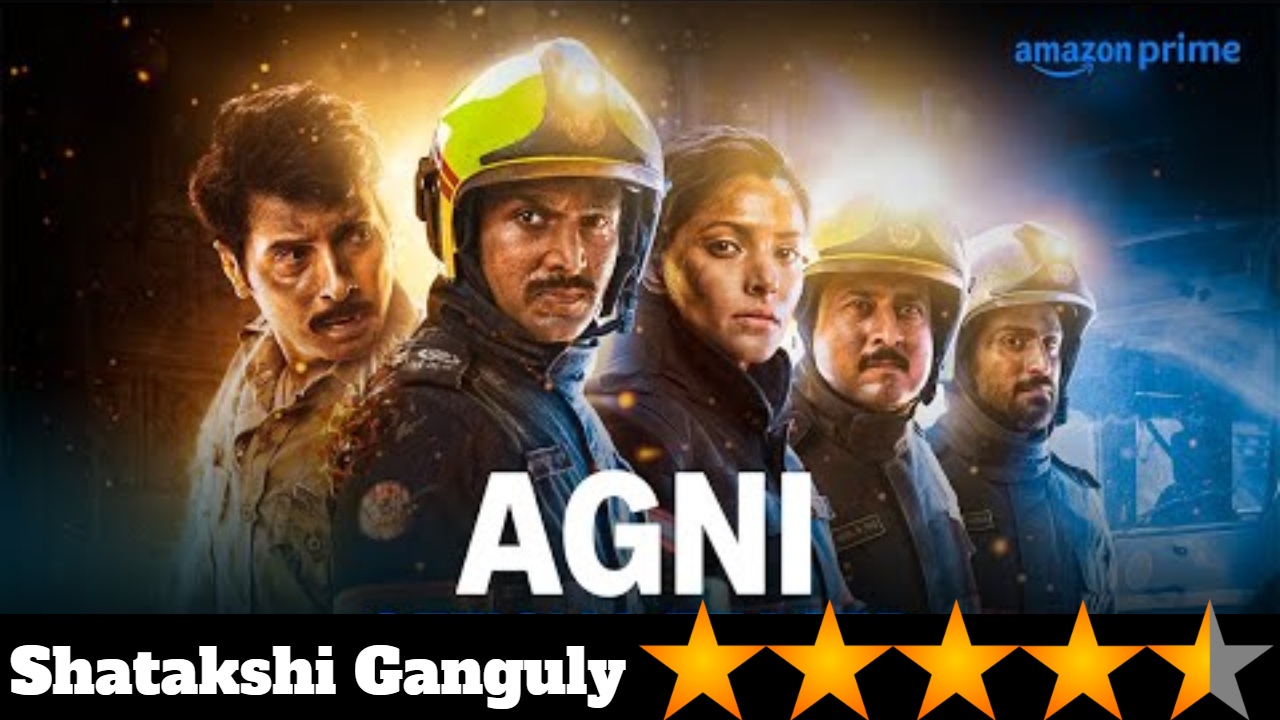Streaming on Amazon Prime Video, Agni, helmed by Rahul Dholakia, is a searing tribute to the often-overlooked warriors who battle not only infernos but the very concept of heroism itself.
With an unsettling rise in fires that grip the city of Mumbai, the film takes us into the harrowing world of its protagonists—firefighters—unveiling the quiet ferocity with which they navigate the chaos, both on the front lines of disaster and in their personal lives. In a genre dominated by fast-talking detectives and gun-wielding lawmen, Agni distills its essence in the unsung courage of those who fight with nothing but hoses and sheer willpower.
At the heart of this combustible narrative is Vithal Rao Surve aka Pratik Gandhi, a firefighter whose very profession seems designed to be ignored. Alongside him stands his brother-in-law, Samit Sawant aka Divyendu Sharma, a police officer whose penchant for heroism thrives in public acclaim.
As the city burns, the two men, despite their mutual disdain, are compelled to join forces in a race against time to uncover the truth behind the mysterious fires that threaten to consume everything. Yet, the film’s conflict extends far beyond the external threat of flames. It burns within its characters, exploring the often uncomfortable chasm between professional recognition and personal sacrifice.
The conflict within the film is not just external but also internal. Vithal, played by Gandhi with a visceral yet restrained energy, navigates the paradox of being a hero in an invisible profession while grappling with family and identity. The film sharply critiques the glorification of law enforcement, represented through Samit, a figure who prides himself on being the “Avenger” of the streets. Samit’s superficial bravado stands in stark contrast to Vithal’s quiet, almost thankless heroism.
This tension reaches its emotional apex through Vithal’s young son, Amar, who idolizes Samit and dismisses his father’s grueling, often dangerous, work as mundane. The film’s ability to navigate this complex father-son relationship without overstating its message is one of its finer moments.
Agni makes a premeditated point of underlining how the heroic work of firefighters is often overlooked, and it’s this contrast—between what society reveres and what it dismisses—that sets the stage for the film’s deeper questioning of heroism.
Dholakia ensures that the audience doesn’t just see Vithal as a man fighting fires; we see him as a person fighting the lack of recognition that so often accompanies his profession.
The film forces us to confront the question: What makes someone a hero?
Is it the badge or the brave act performed in anonymity?
Pratik Gandhi, best known for his breakout role in Scam 1992, delivers a performance that is effortlessly captivating. His portrayal of Vithal is subtle yet powerful, striking a rare balance between internal conflict and outward stoicism. Gandhi, who has mastered the art of expressing layers through minimalism, brings the character to life with poise and intensity. There is an almost physical exhaustion in his portrayal, one that resonates with the viewer long after the scene ends. His character’s journey isn’t just about combating fires; it’s about navigating a life where the flames of duty constantly threaten to engulf him.
On the other hand, Divyendu’s portrayal of Samit, though engaging, often leans too heavily into the stereotypical “tough cop” trope. However, it is through his relationship with Vithal that we understand the film’s core thematic exploration of what it means to be a true hero. The dialogues between these two characters, particularly the bitter exchanges laced with professional rivalry, are some of the film’s most charged moments.
One of the film’s challenges, however, lies in its occasional drift into melodrama. The portrayal of the struggles faced by firefighters can at times feel like a list of grievances rather than a compelling narrative thread. At moments, the script almost tips into the realm of didacticism, as it tries to convey the struggles of the firefighting profession. Fortunately, these moments are brief, and director Dholakia quickly returns to a more engaging narrative that keeps the film from losing its way.
The film never fully abandons the emotional undercurrents, always reminding us that Vithal’s battle isn’t just against fire, but against a system that remains indifferent to his sacrifice.
Yet, as gripping as Agni can be, it is not without its flaws. At times, the narrative threatens to become mired in a laundry list of firefighting woes. The filmmakers, keen to highlight the profession’s grim realities, occasionally slip into a didactic mode, where the focus shifts too heavily onto the challenges faced by firefighters. These moments, while informative, momentarily detract from the emotional core of the story. Fortunately, the film quickly regains its focus, once again placing the spotlight on the complex dynamics between its central characters, reminding us that it is not just the fires they fight, but their own internal infernos.
The film’s true triumph lies in its deft navigation of heroism. Dholakia does not offer us simplistic answers. Instead, he forces us to reflect on what makes someone a hero.
Is it the spectacle of action or the quiet sacrifice behind closed doors?
Agni contemplates this question with a rawness that lingers long after the credits roll.
While Agni could have benefited from deeper exploration of the socio-political ramifications of firefighting, it nevertheless offers a cogent look at a world that is, by layout, invisible to most of us. It’s a gritty, engrossing film that not only thrills but also moves, with a heart that beats for those who rush into danger without thought of recognition. In a world where heroes are often defined by their weapons or words, Agni presents a more profound idea—true heroism is in selfless acts, often uncelebrated, that save lives in the most devastating of circumstances.
IWMBuzz rates it 4.5 stars.

